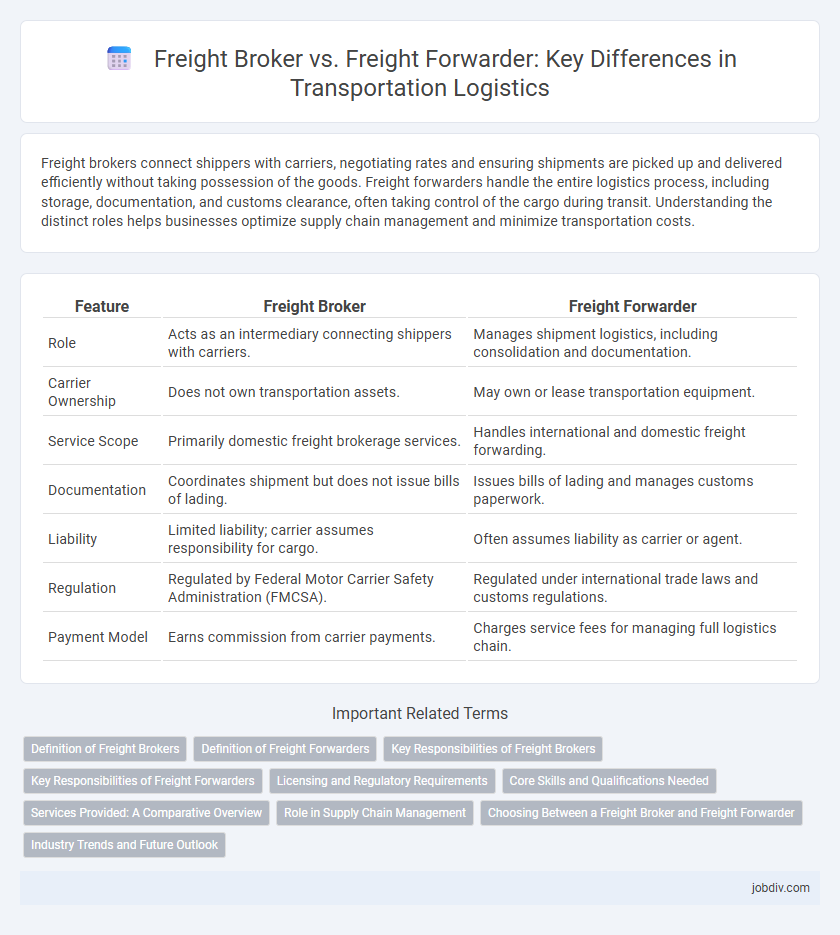Freight brokers connect shippers with carriers, negotiating rates and ensuring shipments are picked up and delivered efficiently without taking possession of the goods. Freight forwarders handle the entire logistics process, including storage, documentation, and customs clearance, often taking control of the cargo during transit. Understanding the distinct roles helps businesses optimize supply chain management and minimize transportation costs.
Table of Comparison
| Feature | Freight Broker | Freight Forwarder |
|---|---|---|
| Role | Acts as an intermediary connecting shippers with carriers. | Manages shipment logistics, including consolidation and documentation. |
| Carrier Ownership | Does not own transportation assets. | May own or lease transportation equipment. |
| Service Scope | Primarily domestic freight brokerage services. | Handles international and domestic freight forwarding. |
| Documentation | Coordinates shipment but does not issue bills of lading. | Issues bills of lading and manages customs paperwork. |
| Liability | Limited liability; carrier assumes responsibility for cargo. | Often assumes liability as carrier or agent. |
| Regulation | Regulated by Federal Motor Carrier Safety Administration (FMCSA). | Regulated under international trade laws and customs regulations. |
| Payment Model | Earns commission from carrier payments. | Charges service fees for managing full logistics chain. |
Definition of Freight Brokers
Freight brokers act as intermediaries connecting shippers with carriers to facilitate the transportation of goods without taking possession of the cargo. They coordinate logistics by negotiating rates, handling freight documentation, and ensuring timely delivery, primarily working within the United States. Unlike freight forwarders, brokers do not arrange storage or international shipping but specialize in domestic freight movement and carrier management.
Definition of Freight Forwarders
Freight forwarders are logistics specialists who coordinate the shipment of goods on behalf of exporters and importers, managing the entire transportation process from origin to destination. They handle tasks such as booking cargo space, negotiating freight rates, preparing shipping documentation, and ensuring compliance with customs regulations. Unlike freight brokers, freight forwarders often take possession of the cargo and provide warehousing, packaging, and cargo insurance services to facilitate seamless freight movement.
Key Responsibilities of Freight Brokers
Freight brokers act as intermediaries between shippers and carriers, coordinating transportation logistics without taking possession of the goods. Their key responsibilities include negotiating freight rates, managing carrier selection, and ensuring timely delivery while maintaining compliance with industry regulations. They facilitate communication between parties to optimize shipment efficiency and resolve potential transportation issues.
Key Responsibilities of Freight Forwarders
Freight forwarders coordinate and arrange the shipment of goods by managing transportation logistics across multiple carriers, including air, sea, and land. They handle documentation, customs clearance, insurance, and cargo tracking to ensure smooth delivery. Their role involves consolidating shipments, negotiating freight rates, and providing comprehensive supply chain solutions tailored to client needs.
Licensing and Regulatory Requirements
Freight brokers must obtain a Federal Motor Carrier Safety Administration (FMCSA) license known as a Motor Carrier (MC) number, along with a surety bond or trust fund of at least $75,000 to comply with regulatory requirements. Freight forwarders require similar licensing but are often subject to different regulations under the International Air Transport Association (IATA) or Federal Maritime Commission (FMC) when handling international shipments. Both entities must adhere to strict compliance standards to legally operate and ensure secure, reliable freight transportation services.
Core Skills and Qualifications Needed
Freight brokers require strong negotiation skills, comprehensive knowledge of transportation laws, and proficiency in logistics software to efficiently connect shippers with carriers. Freight forwarders must possess expertise in international shipping regulations, customs documentation, and supply chain management to coordinate the movement of goods across borders. Both roles demand excellent communication, attention to detail, and problem-solving abilities to ensure smooth freight operations.
Services Provided: A Comparative Overview
Freight brokers primarily connect shippers with carriers to arrange transportation, handling tasks such as negotiating rates and managing shipment logistics without taking possession of the cargo. Freight forwarders provide comprehensive services including cargo consolidation, customs clearance, documentation, and tracking, often assuming responsibility for the shipment during transit. While brokers act as intermediaries facilitating contracts, forwarders deliver end-to-end supply chain solutions, making their service scopes significantly different in transportation management.
Role in Supply Chain Management
Freight brokers act as intermediaries connecting shippers with carriers, facilitating transportation contracts without taking possession of the goods, thus optimizing logistics efficiency. Freight forwarders manage the entire shipping process, including handling documentation, customs clearance, and consolidating shipments to ensure smooth movement through global supply chains. Both roles enhance supply chain management by improving freight coordination and reducing transit times, but freight forwarders offer more comprehensive end-to-end solutions.
Choosing Between a Freight Broker and Freight Forwarder
Choosing between a freight broker and freight forwarder depends on shipment complexity and service requirements; freight brokers specialize in connecting shippers with carriers for individual loads, optimizing cost and efficiency. Freight forwarders manage end-to-end logistics, including consolidation, customs clearance, and warehousing, ideal for international or multi-modal shipments. Evaluating shipment size, destination, and needed logistics support ensures selection of the appropriate partner for streamlined supply chain operations.
Industry Trends and Future Outlook
Freight brokers leverage digital platforms and advanced AI tools to enhance load matching efficiency, reflecting a significant trend toward automation and real-time tracking in the transportation industry. Freight forwarders increasingly adopt integrated logistics solutions and sustainable practices to meet growing demand for end-to-end supply chain visibility and carbon footprint reduction. Industry forecasts predict expanding roles for both, driven by global e-commerce growth and evolving regulatory environments prioritizing transparency and environmental responsibility.
Freight Broker vs Freight Forwarder Infographic

 jobdiv.com
jobdiv.com